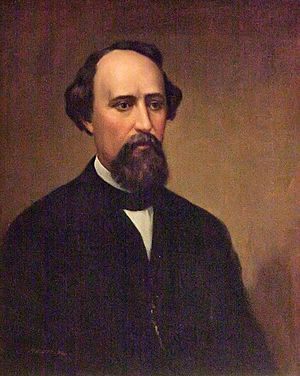Thomas Clement Fletcher facts for kids
Quick facts for kids
Thomas Clement Fletcher
|
|
|---|---|
 |
|
| 18th Governor of Missouri | |
| In office January 2, 1865 – January 12, 1869 |
|
| Lieutenant | George Smith |
| Preceded by | Willard Preble Hall |
| Succeeded by | Joseph W. McClurg |
| Personal details | |
| Born |
Thomas Clement Fletcher
January 21, 1827 Herculaneum, Missouri, U.S. |
| Died | March 25, 1899 (aged 72) |
| Political party | Republican |
| Military service | |
| Allegiance | |
| Branch/service | Union Army |
| Years of service | 1862–64 |
| Rank | |
| Commands | 31st Missouri Infantry 47th Missouri Infantry 50th Missouri infantry |
| Battles/wars | American civil war (POW) |
Thomas Clement Fletcher (born January 21, 1827 – died March 25, 1899) was an important leader in Missouri. He served as the 18th Governor of Missouri during the end of the American Civil War and the start of a period called Reconstruction. He was special because he was the first governor of Missouri who was actually born in the state! His old home, the Thomas C. Fletcher House, is now a historic place.
Contents
Early Life and Education
Thomas Clement Fletcher was born in Herculaneum, Missouri. His parents moved to Missouri from Maryland in 1818. He went to public schools and learned a lot.
Early Career
From 1849 to 1856, Fletcher worked as a clerk in Jefferson County, Missouri. This job involved keeping official records. In 1857, he became a lawyer.
Later, he worked for a railroad company, helping them with land deals. This job made him move to St. Louis. Even though his family owned enslaved people and were Democrats, Fletcher strongly believed that slavery was wrong. He became an Republican after 1856 because of his strong anti-slavery views.
Role in the Civil War
Fletcher was a delegate at the 1860 Republican National Convention in Chicago. He supported Abraham Lincoln to become president.
Military Service
During the American Civil War, Fletcher joined the Union Army. He was a Colonel in the 31st Missouri Volunteer Infantry from 1862 to 1864. Later, he led the 47th Missouri Volunteer Infantry.
In 1862, he was captured during the Battle of Chickasaw Bayou. He was held in a prison called Libby Prison but was later released in May 1863. He was also part of important battles like the fall of Vicksburg and the Battle of Chattanooga. He even led a group of soldiers in the Atlanta Campaign.
Battle of Pilot Knob
In 1864, Fletcher returned home due to illness. After he recovered, he helped organize two new groups of soldiers, the 47th and 50th Missouri infantry. He then led his soldiers in the Battle of Fort Davidson, also known as the Battle of Pilot Knob, in Missouri. In this battle, his actions helped stop General Sterling Price from advancing on St. Louis. Because of his bravery and leadership, he was given the honorary rank of brigadier general.
Political Career
In 1864, Thomas Fletcher was chosen to run for governor of Missouri by the National Union Party. He won the election and served as governor from 1865 to 1869.
Abolishing Slavery
On January 11, 1865, Governor Fletcher made a special announcement called a "Proclamation of Freedom." This announcement supported a new rule that officially ended slavery in Missouri.
Challenges as Governor
As governor, Fletcher faced many challenges. He had to decide what to do about former Confederate soldiers. He also dealt with railroad companies that owed money to the state. He worked to improve public education for all children in Missouri. He helped sell the railroad property, which reduced the state's debt. He also made sure the public school system was better organized.
Fletcher tried to change the state's rules so that people wouldn't have to take a special "test oath" to vote or work in certain jobs. However, he was not successful in this effort. He also supported schools that trained teachers and wanted more money for the state university, especially for farming education.
Later Life
After his time as governor, Fletcher went back to St. Louis and worked as a lawyer. Later, he moved to Washington, D.C., where he continued his law practice until he passed away. He also wrote a book called Life and Reminiscences of General Wm. T. Sherman in 1891.
Thomas Clement Fletcher was buried in Bellefontaine Cemetery in St. Louis. The town of Fletcher, Missouri, and an old U.S. Army fort in Kansas, Fort Fletcher, are named after him.
 | DeHart Hubbard |
 | Wilma Rudolph |
 | Jesse Owens |
 | Jackie Joyner-Kersee |
 | Major Taylor |

